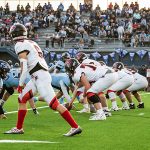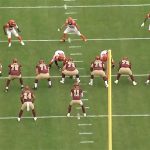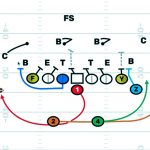In a surprising move that resonated both sentimentally and strategically, William Nylander, the skilled Swedish forward for the Toronto Maple Leafs, opted for a jersey number change from 29 to 88 at the onset of the 2023-24 NHL season.
This decision transcended the realm of sports aesthetics, delving into a profound personal narrative. Nylander’s choice was driven by a deep-seated desire to pay homage to his father, Michael Nylander, a distinguished former NHL player.
This introduction sets the stage for an exploration into the intricate layers of familial legacy, personal growth, and the nuanced dynamics that prompted Nylander to embrace a new identity on the ice.
Who Is William Nylander?
William Nylander is a prominent Swedish professional ice hockey player, born on May 1, 1996. As a forward for the Toronto Maple Leafs in the National Hockey League (NHL), Nylander has become known for his exceptional skill, agility, and scoring prowess.
His hockey roots run deep, with his father, Michael Nylander, also a former NHL player. William Nylander’s journey to NHL stardom began in Sweden, where he played junior hockey before making the transition to North America.
His on-ice finesse and contributions to the Maple Leafs have solidified his status as a key player, showcasing a combination of family legacy and individual talent in the world of professional hockey.
Why Did William Nylander Change Numbers?
Fans of the Toronto Maple Leafs couldn’t help but notice a significant change in William Nylander’s appearance on the ice at the beginning of the 2023-24 NHL season.
The skilled Swedish winger, previously donning the number 29, made a deliberate switch to number 88.
This move prompted curiosity among hockey enthusiasts, leading to questions about the reasoning behind Nylander’s decision and its implications for him and the team.
Honoring a Hockey Legacy
Nylander’s switch to number 88 wasn’t impulsive; it was a heartfelt tribute to his father, Michael Nylander, who wore the same number during his notable NHL career.
William aimed to honor his father’s legacy, expressing admiration for him as a mentor and role model.
Nylander’s Connection to 88
Beyond familial homage, Nylander’s choice was grounded in personal comfort and confidence.
Having previously worn 88 during his junior hockey days in Sweden, he believed the number change would positively impact his on-ice performance, aiming to emulate his father’s success and make him proud.
Controversy and Criticism
The decision to adopt number 88 wasn’t without controversy. Critics argued Nylander disrespected Patrick Kane, a star player associated with the same number.
Nylander clarified that his choice was solely to honor his father, emphasizing admiration for Kane and a genuine desire to pay homage without causing offense.
Teammates’ Support and Nylander’s Seasonal Goals
Despite external criticism, Nylander received backing from teammates and coaches who viewed the number change as a personal choice.
They expressed hope that this shift would positively influence Nylander’s performance, addressing concerns of inconsistency and injuries in previous seasons.
With a renewed commitment, Nylander aspires to elevate his game and contribute to the Maple Leafs’ playoff success.
Public Reception

The Maple Leafs’ fanbase exhibited mixed reactions to Nylander’s switch from 29 to 88. While some embraced the sentimental gesture towards his father, others voiced concerns about the potential controversy surrounding the already iconic number.
The public reception highlighted the delicate balance athletes navigate between personal tributes and the expectations of their devoted fan communities.
Marketing and Merchandising Impact
Beyond the emotional and symbolic aspects, Nylander’s jersey number change had business implications. The alteration necessitated adjustments in marketing, merchandising, and fan engagement strategies.
The Maple Leafs organization and its sponsors navigated the challenge of incorporating the new number into promotional materials and merchandise, ensuring a seamless transition for fans.
Historical Precedents
Nylander’s decision to switch numbers aligns with a broader trend of athletes selecting jersey numbers for personal and meaningful reasons.
Examining historical precedents, this section explores instances where players opted for numbers carrying sentimental value, illustrating how these choices contribute to the rich tapestry of stories and legacies within the world of professional sports.
The Economic Ripple Effect of Nylander’s Jersey Switch
William Nylander’s transition from jersey number 29 to the iconic 88 not only stirred emotional currents among fans but also set off a chain reaction in the commercial sphere.
This section delves into the tangible economic impact of Nylander’s number change, exploring how it influenced jersey sales and the broader landscape of sports merchandising.
Jersey Sales Surge
Nylander’s jersey change triggered a notable surge in sales, underlining the fervor of Maple Leafs fans. Supporters, eager to own a piece of this symbolic shift in team history, flocked to purchase the newly adorned 88 jerseys.
The commercial success underscored the potent intersection between sports fandom and consumerism, where player choices directly influence market trends.
Navigating the Shift in Imagery
The commercial impact extended beyond jersey sales to the broader spectrum of team merchandise. The Maple Leafs and their sponsors faced the challenge of adapting marketing strategies and rebranding products to align with Nylander’s new number.
From promotional materials to team memorabilia, the shift demanded a swift and strategic response to meet the changing demands of the consumer market.
Collateral Merchandising
Nylander’s number change rippled into collateral merchandising avenues, touching various facets of the fan lifestyle. From caps to accessories and lifestyle products, the commercial landscape adapted to incorporate the new number 88.
This adaptation reflected the dynamic nature of sports merchandising, where player choices extend beyond jerseys to influence a diverse range of products that cater to the broader fan experience.
Impact on Endorsements and Partnerships

Beyond direct sales, Nylander’s number change had implications for sponsorship dynamics. Endorsement deals and partnerships with brands were recalibrated to align with the refreshed imagery associated with the number 88.
The economic ripple effect emphasized how a player’s personal choices can reverberate through the intricate web of sports marketing, influencing not just team merchandise but also broader brand affiliations.
The Synergy of Sports and Commerce
In essence, Nylander’s jersey switch became more than a symbolic gesture; it became a commercial phenomenon.
The economic ripple effect showcased the symbiotic relationship between sports and commerce, where the choices of athletes extend beyond the field, profoundly shaping the financial landscape of professional sports.
Fan Reactions to Nylander’s Number Change
In the Toronto Maple Leafs embarked on the 2023-24 NHL season, fans were quick to notice a significant change in William Nylander’s on-ice presence — a switch from the familiar number 29 to the iconic 88.
This deliberate alteration sparked a spectrum of reactions among the passionate fanbase, unveiling a fascinating tapestry of sentiments and perspectives.
Supporters of the Tribute
A contingent of fans wholeheartedly embraced Nylander’s decision, recognizing the deeply sentimental nature of the jersey switch.
They celebrated the winger’s homage to his father, Michael Nylander, viewing it as a touching and meaningful gesture that added a layer of personal connection between the player and the fan community.
Concerns Over Number 88
Conversely, Nylander’s number change didn’t go without its critics. Some fans voiced reservations, expressing concerns about the potential controversy tied to the number 88.
The association with Patrick Kane, a well-established star, raised questions about sportsmanship and tradition, fueling debates among fans about the appropriateness of such a move.
Navigating Tradition and Change
The fan reactions highlighted a delicate balance between honoring tradition and embracing change within the hockey community.
Maple Leafs supporters found themselves at the crossroads of appreciating the sentimental tribute to Nylander’s family legacy and wrestling with the implications of adopting a number with pre-existing associations in the broader NHL landscape.
Social Media Buzz
In the age of social media, fan reactions transcended arena conversations. Platforms like Twitter and Instagram became arenas for digital discourse, where fans engaged in spirited discussions, sharing memes, and opinions, and even creating hashtags related to Nylander’s number change.
The online sphere mirrored the diverse range of perspectives that echoed within the traditional fan gatherings.
FAQS
Why did William Nylander change his jersey number from 29 to 88?
William Nylander changed his jersey number to 88 as a heartfelt tribute to his father, Michael Nylander, who wore the same number during his NHL career.
Was there any specific reason for choosing the number 88?
Yes, William Nylander chose the number 88 because it was the same number his father, Michael Nylander, wore during his distinguished NHL career.
How did fans react to Nylander’s number change?
Fan reactions were mixed. While some embraced the sentimental tribute to Nylander’s father, others expressed concerns about the controversy surrounding the number 88, which is also associated with star player Patrick Kane.
Did Nylander address the controversy surrounding the choice of number 88?
Yes, William Nylander acknowledged the controversy and clarified that his decision was not intended to disrespect Patrick Kane or anyone else.
What impact did Nylander’s number change have on commercial aspects like jersey sales?
Nylander’s jersey change had a substantial impact on commercial aspects. There was a surge in jersey sales as fans sought to own a piece of this symbolic shift in team history.
To Recap
William Nylander’s decision to change his jersey number from 29 to 88 was a poignant and multi-faceted choice.
Motivated by a deep desire to honor his father’s storied NHL career, Nylander embraced the familial legacy associated with the iconic number 88.
The switch became a symbol of personal growth, confidence, and a commitment to family heritage.
While met with a spectrum of fan reactions and some controversy, Nylander’s choice also reverberated commercially, influencing jersey sales and the broader landscape of sports merchandising.
Ultimately, this seemingly simple number change encapsulates a rich narrative that intertwines personal sentiment with the intricate dynamics of professional sports and commerce.








James Felix